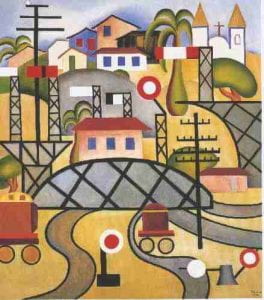
Tarsila do Amaral, Estrada de Ferro Central do Brasil (1924)
The 20th and 21st Century Cultures Workshop is pleased to welcome:
Victoria Saramago
Associate Professor in the Department of Romance Languages & Literatures and the College, University of Chicago
Anthropophagocene: Energy and the Anthropocenic Imagination of Brazil’s Cannibalist Avant-Gardes
Mon, April 22, from 5:00-6:30pm
Walker 403
with respondent
Edgar Garcia, Associate Professor, Department of English Language and Literature, University of Chicago
This chapter investigates the place of avant-garde movements in the energy-intensive regimes of the Anthropocene by underscoring how, in multiple forms, energy has been at the basis of the twentieth-century Brazilian cultural and intellectual tradition of anthropophagy, or cultural cannibalism. First formulated in the 1920s by São Paulo’s avant-garde movement and spearheaded by the writer Oswald de Andrade, anthropophagy reenacts the cannibalist rituals of Amerindian societies in the cultural arena: as a form of resistance to cultural hegemony, Brazilian artists and writers would obtain their creative strength by devouring those in the Global North. This search for aesthetic innovation through assimilation and consumption, which would remain widely influential throughout the twentieth century, was expanded by Andrade’s later work into a broader political and existential utopia that would spell the end of patriarchy and labor exploitation. This chapter underscores how energy, and more specifically electrical energy, play a critical infrastructural role in the many facets of the anthropophagic gesture, from an unacknowledged influence of nineteenth-century thermodynamics in Andrade’s 1920s manifestos as well as the failures and contradictions of energy supply in his poetry and theater, to a full embracing of an energy-intensive mindset in Andrade’s matriarchal utopia and later movements such as the new cinema and the tropicalism of the 1960s and early 1970s. I analyze a range of works from different periods of Andrade’s career as well as major works from the “tropicalist moment,” including cinema, theater, and music, in order to show how their unsystematic yet persistent engagement with the potentialities and contradictions of an abundant energy supply contributes to a cultural imagination of the Anthropocene in Brazil. I contend that the consumption of the cultural goods of hegemonic cultures slowly morphs, in the anthropophagic tradition, into the consumption of the planet itself and its natural resources—in other words, anthropophagy gradually becomes what I call an Anthropophagocene. Here lies, I argue, a major friction between readings of anthropophagy as precursor to a decolonial paradigm and the fact that, particularly through Andrade’s lenses, such gesture remains fundamentally tied to environmental exploitation.
Victoria’s paper (to be read in advance) can be found here. The password will be distributed to our listserv. Click here to join.
Our meetings are open to the University of Chicago community and visitors who comply with University of Chicago vaccination requirements. We are committed to making our workshop fully accessible for people with disabilities. Please direct any questions and concerns to the workshop coordinators, Cassandra Lerer (crblerer@uchicago.edu) and Rhya Moffitt (rhya@uchicago.edu).